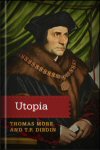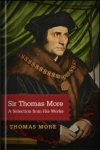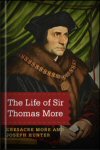Select Life and Works of Thomas More (8 vols.)
Digital Logos Edition
Overview
The Select Life and Works of Thomas More presents the writings and biographies of Thomas More, a saint and statesman who was martyred during the bloody reign of King Henry VIII. Learn about this fascinating Reformation martyr through his own words and faithful biographical sketches. This collection includes More’s influential Utopia and his controversial The Supplication of Souls. You’ll encounter More’s sharp humor throughout this collection, particularly in The Wisdom and Wit of Blessed Thomas More. Four biographies present the facts of More’s life, including an intimate portrait by his son-in-law William Roper and another by his great-grandson Cresacre More.
In the Logos editions, these volumes are enhanced by amazing functionality. Scripture citations link directly to English translations, and important terms link to dictionaries, encyclopedias, and a wealth of other resources in your digital library. Perform powerful searches to find exactly what you’re looking for. Take the discussion with you using tablet and mobile apps. With Logos Bible Software, the most efficient and comprehensive research tools are in one place, so you get the most out of your study.
Are you a fan of Thomas More’s Utopia? Check out Critical Commentaries and Studies on Thomas More’s Utopia (5 vols.).
Key Features
- Presents the fiction, poetry, and prose of Thomas More
- Offers insight into a tumultuous period Church history in England
- Includes several biographies
Product Details
- Title: Select Life and Works of Thomas More
- Volumes: 8
- Pages: 2,410
- Christian Group: Catholic
- Resource Type: Collected Works
- Topic: History—Renaissance
Individual Titles
- The History of the Reigns of Edward V and Richard III by Thomas More
- Utopia by Thomas More, edited by T.F. Dibdin
- The Supplication of Souls by Thomas More
- Sir Thomas More: A Selection from His Works by Thomas More
- The Wisdom and Wit of Blessed Thomas More by Thomas E. Bridgett
- The Life of Sir Thomas More by William Roper and Samuel Weller Singer
- The Life and Writings of Sir Thomas More by Thomas E. Bridgett
- The Life of Sir Thomas More by Cresacre More and Joseph Hunter

This volume covers the intrigue, power struggles, and military battles surrounding the reigns of Edward V and Richard III. Thomas More outlines the main incidents of each regime, from the nobles’ attempt to remove young Edward V from the protection of his mother to the fallout of Richard III’s demise. This volume includes three plates of engravings designed for the work, a portrait of King Richard, the depiction of the murder of Edward V by the Duke of York, and the Battle of Bosworth Field.

This book is a classic work of both fiction and political philosophy. More depicts a communal society of a fictional island nation, in which there’s no concept of private property. This edition of Thomas More’s Utopia is enhanced by biographer T.F. Dibdin’s introduction and notes, as well as a biographical sketch of More.
Thomas Frognall Dibdin (1776–1847) was a British biographer. He studied at St. John’s College, Oxford, and was ordained as a clergyman in 1804. He served as the rector of St. Mary’s in Bryanston Square. In 1812, Dibdin began the Roxburghe Club—a prototype of today’s modern book club—with Earl Spencer. He is the author of Introduction to the Knowledge of Editions of the Classics and Biblitheca Spenceriana.

The Supplication of Souls
- Author: Thomas More
- Publisher: The Newman Press
- Publication Date: 1950
- Pages: 187
The Supplication of Souls is Thomas More’s response to a political tract—Simon Fish’s Supplication for the Beggars—circulated against the Roman Catholic Church in 1529. More defends the Church from Fish’s attacks with his characteristic directness and humor.

This volume contains a selection of both prose and poetry from Thomas More, including portions of Utopia and a selection of his political and theological writings. Among the writings included are letters, thoughts, devotionals, and poems.

Noted Catholic author Thomas E. Bridgett highlights Thomas More’s characteristic wisdom and humor, and contributes an essay on More. Bridgett divides More’s writings into five categories: Ascetic; Dogmatic; Illustrative of the Period; Fancies, Sports, and Merry Tales; and Colloquial and Quaint Phrases.
Thomas E. Bridgett (1829–1899) was a Roman Catholic convert, priest, and author in England. He attended St. John’s College, Cambridge. He was received into the Catholic Church in 1850 and ordained a priest in 1856. He founded the Confraternity of the Holy Family in Limerick, Ireland in 1868. He wrote In Spirit and Truth, Our Lady’s Dowry, and The Life of Blessed John Fisher. His most popular work was the Life of Blessed Thomas More.

This biography of Thomas More was written by More’s son-in-law, William Roper. From the privileged position of family intimacy, Roper’s biography of More offers valuable insight, both into the person of Thomas More and into the political turmoil that defined his destiny.
William Roper (1496–1578) was a biographer and the son-in-law of Thomas More. He studied law at Lincoln’s Inn, and was appointed to the Court of King’s Bench after being called to the bar in 1525. He held various parliamentary posts and was High Sheriff of Kent from 1554 to 1555. Despite being a Roman Catholic, he remained prothonotary of the Court of King’s Bench, though he was unpopular with Protestants and Elizabethan loyalists.
Samuel Weller Singer (1783–1858) was an author and Shakespearean scholar. He was a librarian to the Royal Institution from 1827 to 1835, and was a fellow of the Society of Antiquaries. He edited several reprints of sixteenth-century literature, including John Harington’s Metamorphosis of Ajax, and poems by George Chapman and Richard Lovelance.

Biographer Thomas E. Bridgett quotes Thomas More’s impatience with pious depictions of the saints’ lives, “They have scarcely left a life of martyr or of virgin without foisting into it something untrue.” To avoid committing this himself, Bridgett collated the biographies of More from reliable resources to present the facts of More’s life and character as they appear in this volume.
Thomas E. Bridgett (1829–1899) was a Roman Catholic convert, priest, and author in England. He attended St. John’s College, Cambridge. He was received into the Catholic Church in 1850 and ordained a priest in 1856. He founded the Confraternity of the Holy Family in Limerick, Ireland in 1868. He wrote In Spirit and Truth, Our Lady’s Dowry, and The Life of Blessed John Fisher. His most popular work was the Life of Blessed Thomas More.

Thomas More’s great-grandson wrote this biography covering the facts of his life and offering a tender account of More’s final days. This edition includes notes and illustrations from British antiquarian Joseph Hunter.
Cresacre More (1572–1649) was the great-grandson of Thomas More. Originally destined for the priesthood, More was called home after the death of his eldest brother to head the family estate of More Hall. More carried on the Catholic tradition of the family, despite persecution, and wrote a biography of his great-grandfather.
Joseph Hunter (1783–1861) studied theology at Manchester College in York and was established as a Unitarian Minister in Bath in 1809. He was well-known as an antiquarian and keeper of public records. Some of his research was published by the Harleian Society in a four-volume collection titled Familiae Minorum Gentium.
About Thomas More
Thomas More (1478–1535) was an English lawyer, social philosopher, author, statesman, and noted Renaissance humanist. He was an important councilor to Henry VIII of England and, for three years toward the end of his life, lord chancellor. More opposed King Henry VIII’s separation from the Catholic Church, and was martyred on Tower Hill in 1535. He is recognized as a saint within the Catholic Church and is commemorated by the Church of England as a Reformation martyr.